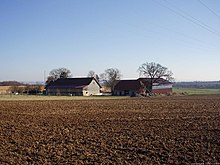Eichhauser yard
The Eichhäuser Hof is a former farm estate of the barons of Gemmingen near Bonfeld , a district of Bad Rappenau in Baden-Württemberg , which was built around 1850, where grain and livestock were grown and then fruit was grown on a 30 hectare plantation.
history
The farm was laid out in 1852 by Moriz von Gemmingen (1817–1883) in the cleared Breitlochwald near Bonfeld. The name Eichhäuser Hof comes from the settlement of villa Eichusa , attested in the 9th century , which was located near Bonfeld. When the Breitlochwald was cleared, more of the foundations came to light that had been known for generations and that were generally regarded as the remains of the submerged settlement. Later findings have shown, however, that the foundations at the Eichhäuser Hof are of Roman origin and that the early medieval settlement was at a different location.
The founder of the farm came from the former imperial knightly family von Gemmingen-Guttenberg , who owned the nearby village of Bonfeld from the 15th century until the mediatization in 1806 and who continued to own large estates there. Moriz was initially a senior judicial officer in Ulm, but from 1857 he managed the farm himself before returning to the civil service in Ulm in 1868, tired of country life. In 1905 one of his sons, Ernst Karl Friedrich von Gemmingen (1863–1939), moved into the Bonfeld Lower Castle and from there managed the farm as a tenant and, after the dissolution of a Gemmingen condominium administration that existed until 1932, ultimately as the sole owner. The establishment of an orchard goes back to him in 1929. After his death, his property went to his only son Reinhard von Gemmingen (1908–2001), who after his marriage in 1932 also moved to the Bonfeld Lower Castle and ran the farm from there. Reinhard von Gemmingen spent the Second World War as an officer. When he and his family returned to Bonfeld at the end of the war, the lower castle was occupied by former foreign workers, so the family moved to the estate and continued to manage it. The management of the estate was carried out with employees who also lived there and with day laborers. In 1946 60 people were employed on the farm. The farm's products were marketed at the Heilbronn wholesale market.
Reinhard von Gemmingen continued to live with his family on the farm and never returned to the lower castle, because it burned down in 1956, and in 1971 it was finally blown up. Reinhard's successor on the farm was to be his son Michael von Gemmingen (1943–1976), who was a qualified agricultural engineer and had completed one of his internships on the farm. However, he died in a car accident in Egypt in 1976. His widow and daughter initially returned to the farm, but then moved to Munich, where Reinhard's daughters had been living for a long time. Reinhard von Gemmingen ran the farm and the orchard well into old age. In 1989 he gave up the orchard and sold most of the property to the Kraichgauer Adelige Damenstift . After Reinhard's death, the courtyard buildings were transferred from his heiresses to a veterinarian who renovated them and has been running a practice there ever since.
The remains of the portal of the Bonfeld Lower Castle , which was blown up in 1971, have been incorporated into the current open space design of the courtyard .
literature
- Rudolf Petzold: Bonfeld and the barons of Gemmingen-Guttenberg . In: Heimatbuch Bonfeld, ed. from the city of Bad Rappenau 2000.
- Maria Heitland: Family chronicle of the barons of Gemmingen. Continuation of the chronicles from 1895 and 1925/26 , Elztal 1991, pp. 97-102.
Web links
Coordinates: 49 ° 12 ′ 7 ″ N , 9 ° 6 ′ 7.5 ″ E


